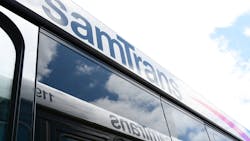San Mateo County voters secure late transit win for Measure W
Transit landed a final election win following news that San Mateo County voters narrowly passed Measure W, which will create approximately $80 million in annual investments to congestion relief and mobility expansion.
Measure W is a half-cent sales tax that will go into effect July 1, 2019, and is expected to generate $2.4 billion over a 30-year period. It required two-thirds of the vote (66.67 percent) to pass. The final tally of votes show it passed with 66.87 percent of the vote. A mere 541 votes pushed the measure above the passing threshold.
“We, with our partners, are grateful for this opportunity and we are prepared for the challenge of putting these funds to work to create transportation and traffic solutions for everyone who lives and works in San Mateo County,” said San Mateo County Transit District General Manager/CEO Jim Hartnett. “Getting to this point was a tremendous team effort and we are incredibly thankful to everyone who helped make it happen.”
Funds generated by Measure W will distributed by guidance set forth in the Congestion Relief Plan. The plan was developed to reflect how county residents feel transportation funding should be invested. The Congestion Relief Plan includes five categories. Countywide highway congestion improvements will receive 22.5 percent of the funds, local safety, pothole and congestion relief improvements will receive 12.5 percent and bicycle and pedestrian improvements will receive 5 percent.
The remaining 60 percent of funds will go toward regional transit connections (10 percent), which will better connect residents traveling from San Mateo County neighboring counties with new and enhanced transit options. Half of the funds will go toward county public transportation system improvements to maintain and enhance bus, paratransit, rail and other countywide mobility services.
“There are projects and programs ready to go, from express buses to microtransit to reducing chokepoints at our highway interchanges. The funding provided by Measure W will help to make them a reality,” said Transit District Board Chair Charles Stone.
The Congestion Relief Plan includes a new citizen oversight protocol to ensure it is implemented as intended. The protocol requires that a 15-member independent citizen oversight committee be appointed. The committee would meet regularly to monitor decision-making, ensure accountability and provide assurance that the plan is implemented in a way that stresses public transparency.
Earlier this month, the American Public Transportation Association reported that 85 percent of transit initiatives on the November ballot were passed.

Mischa Wanek-Libman | Group Editorial Director
Mischa Wanek-Libman is director of communications with Transdev North America. She has more than 20 years of experience working in the transportation industry covering construction projects, engineering challenges, transit and rail operations and best practices.
Wanek-Libman has held top editorial positions at freight rail and public transportation business-to-business publications including as editor-in-chief and editorial director of Mass Transit from 2018-2024. She has been recognized for editorial excellence through her individual work, as well as for collaborative content.
She is an active member of the American Public Transportation Association's Marketing and Communications Committee and served 14 years as a Board Observer on the National Railroad Construction and Maintenance Association (NRC) Board of Directors.
She is a graduate of Drake University in Des Moines, Iowa, where she earned a Bachelor of Arts degree in Journalism and Mass Communication.


